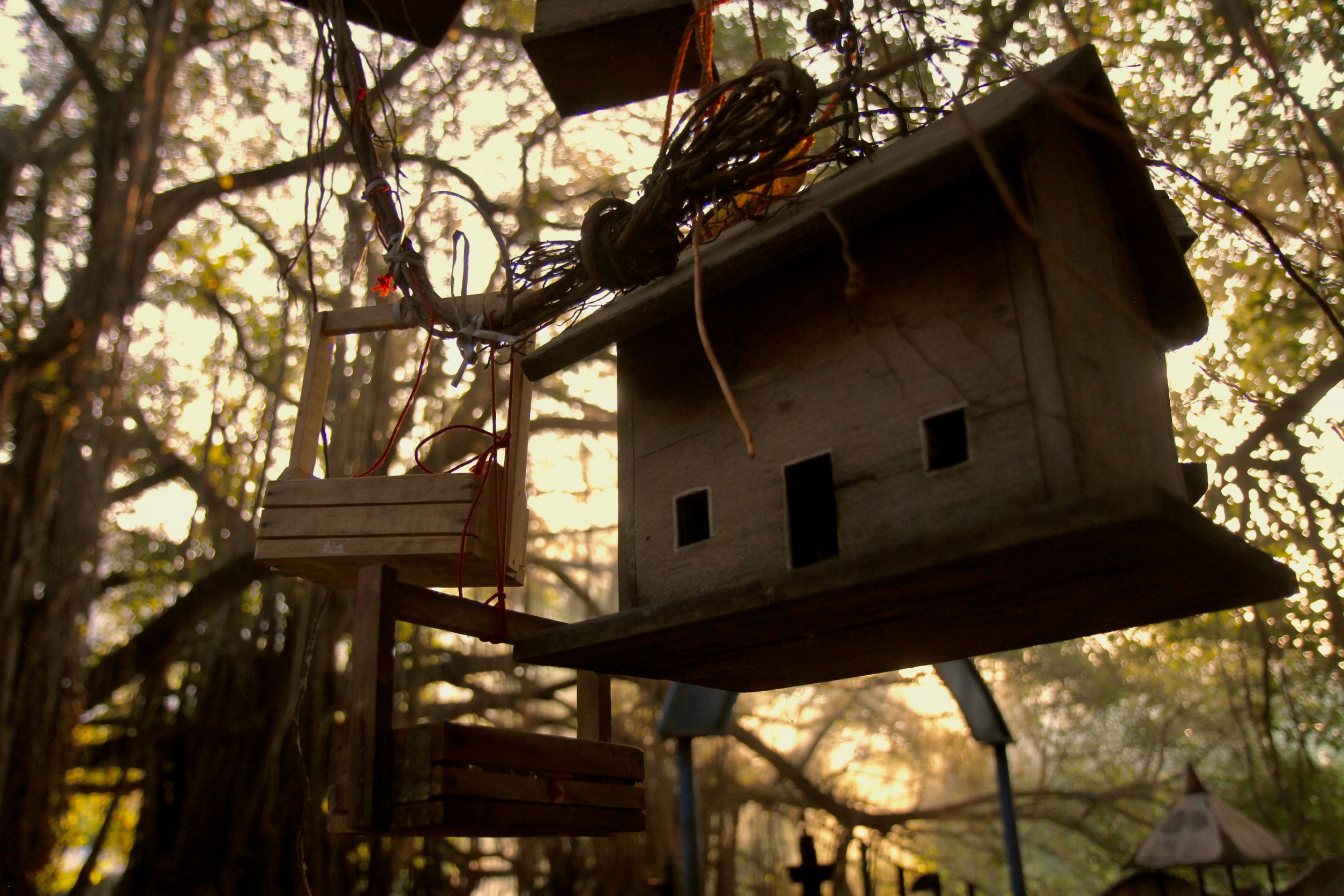By MEERA NAIR
By the time the car stops at the end of the dirt road, we’ve been jolting along for an hour. Before us is the banyan tree we have come to see—its giant trunk surrounded by hanging roots, its distant crown shutting out the sky.
It is summer in Kerala, and the world is liquid and shimmery with heat. The roads and fields are parched, waiting, suspended in a burning delirium for the moment the monsoon will break. My aunt Sudha and I have just driven through miles of sun-blasted paddy fields, but the abrupt immensity of the tree makes the light feel shadowed, as if dusk has fallen at noon. A hushed feeling comes over me as the dark, looming presence asserts itself.
As the two of us step out of the car, Sudha falls quiet, and her pretty face takes on a devout, absorbed expression. I’m not particularly spiritual, but I feel like I am in what the Celts call “a thin place,” where the boundary and epochs feel porous, and worlds both seen and unseen seem to exist at once. I wonder if Sudha is also experiencing what I am feeling—that sense of being near a mystery, something beyond ordinary understanding.
In a sign of respect, Sudha tugs off her sandals and walks barefoot to the tree. I take my shoes off too and follow her. The courtyard-like space under the tree is empty, and a few scattered visitors murmur quietly beneath the low rustle of its leaves.
Sudha had talked up the banyan in the car. She’d watched several features about it on television, and as she related stories of the supposed miracles it has wrought, I teased her, saying she sounded starstruck, like the tree was a celebrity she had rushed over to see.
Even today this is how I think of her—as someone who had an unshakeable belief that the divine was manifest in the everyday. She was always the most devout in our family, doting on Krishna, the pale blue God beloved of Hindus: to her, he was a benign protector, another member of her family, someone she could talk to in an overly familiar tone, even scolding him like he was a bratty teenager if he didn’t deliver what she wanted.
Krishna, why did you let the cow get loose? Now—see—she’s gone and eaten all my marigolds!
On the altar in her prayer room was a framed painting of baby Krishna reclining on a heart-shaped banyan leaf, his pudgy pink toes raised to his rosebud mouth. For Hindus, the image represents rebirth: the God-child emerging from the chaos after the Great Flood has destroyed the universe to create it anew. To Sudha, the image was simply God as a cute baby, another version of Him she could madly love.
As we walk toward the tree, the packed dirt under my bare feet is cool and smooth. I smell smoke from incense sticks and a faint, underlying scent of decay from the fallen leaves. Someone, perhaps the panchayat, the village council, has made a half-hearted attempt to build a platform out of red bricks around the base of the tree, to exert human control over the banyan’s rambunctious roots, which writhe up from the ground as if frozen in the midst of a past upheaval.
We pass beneath a tall, narrow frame made of iron pipes. It delineates the ochre mud of the parking lot and the open ground from the tree’s base. As we get closer, the tree looms larger and larger, drawing us in. The banyan’s hanging aerial roots, some as thick as a human thigh, close in on all sides of the trunk’s vast black girth. The side of the bole facing us has a large hollow, inside which devotees have placed lamps with lit wicks. The bark above the cavity has been smeared with sacred vermilion powder and is stained with soot and lamp oil.
We are in a temple, and the deity being worshipped is the tree.
A massive iron trident, the Trishul, is staked into the soft mud in front of the tree. It is the favored weapon of certain Hindu gods, useful for defeating evil, both real and metaphorical. “Look,” Sudha whispers, pointing to the glass bangles in bridal red and gold that village girls have slid onto its dread spearlike tines. “They are hoping that they get married soon.” Inside the tree trunk, beside the lamps, are several round, smooth stones that the villagers have painted red and blue in an attempt to transform them into idols that they can worship as their own mini-gods.
But the bangles and the rocks are not the only manifestations of longing for divine intervention here.

Small plywood houses shaped like a child’s sketch, with sloping roofs and two cutout windows, hang from the branches. Higher up, intrepid climbers have tucked miniature trucks and cars, as well as tiny, perfect cradles, into the dips and crannies of the branches. They make me sad: whoever it was who clambered up the trunk with a ball of string and nails, or found a nook to leave these empty cradles and the toylike houses, believed in the power of the tree to deliver what they longed for. I want a companion, I want a child to love, I want my own home, I want a vehicle: hundreds of people have visited the tree and publicly revealed their secret desires, confessed them to the tree for safe-keeping and conveyance to some sacred unknown. I am human; therefore I believe against all odds. The banyan, far removed from the judgments of others, allowed its devotees to display desire and need openly. This site, then, is both profound and profane, sacred, yet rooted in the material, messy wants of ordinary life—the need for a womb filled, for the security of one’s own home, for the freedom a personal vehicle can bring.
I imagine the tree’s hanging roots and its giant trunk as conduits, which, along with its rising sap and the susurration of its leaves, convey the deepest longings and the secret stories of its devotees, all that clamorous human need, up to the silent gods hoping they are out there in the ether, listening, willing to act.
I glance at Sudha—her reactions are the ones I am most interested in; she’s my guide into this world.
The women in my family all resemble each other, and she looks like an older version of me if I wore a sari, sported a long braid, and had a sharper chin. I call her Chechi, or Big Sister, instead of Amayi. She used to chase me around the house or get into long, heated arguments with me when we were younger, and it was difficult to see how that rowdy companion could be old enough, or serious enough, to be called “Aunt Sudha” with all the attendant respect that term demanded. When a joke struck her as particularly funny, she’d pinch me quick and hard, giggling like a child.
Sudha, my mother, and their middle sister were the last surviving members of a large family that had once overflowed our ancestral home. Now my grandparents are dead, and the branching generations have been reduced to my mother, who lives alone in the big house, with the rest—a few cousins, a brother, another aunt—scattered in cities far away or settled, like me and Sudha’s younger son, in America. Some of us come back to visit every few years, tourists in our own country. Growing up, this was the map of my world: the mountain visible from the back gate of my mother’s house, with six white lines of waterfalls flowing down its surface; the path that ran across our fields straight to Sudha’s house. When I walked through the gate, I knew I would find her in the kitchen, cooking in a bedlam of pots and pans, chopped vegetables piled high on her many cutting boards. Invariably she would be in an old, faded sari, shoved any which way into the waistband of her trailing petticoat, her hair uncombed—surprisingly disheveled for the wife of a bank executive, a “big man” in the village who often had important visitors dropping in to ask for advice on financial matters.
After lunch I would paint her nails, bending over her broad feet and the wide gap between her big toe and the rest. Why do you even bother? I have peasant’s feet, she would laugh, not like yours, all pedicured in America.
Sudha and I visited the tree in June of 2015. Eight months later, the car she was traveling in tumbled into a sunlit rice paddy in the middle of the day. She wasn’t wearing her seat belt. A metal siding inside the car, loosened by the impact, sliced the back of her skull open, spilling bits of her brain onto the seats. She was returning from a family celebration and had dressed up in a brocade silk sari in her favorite emerald green, with a matching gold necklace and earrings. The driver of the ambulance that came to take her to the morgue said she looked beautiful, like a bride. He took the earrings and necklace off her body and put them in a plastic sandwich bag. Later, when the jewelry was returned and placed in a bowl to be washed, the water turned rust red. For months after her funeral, her husband, who had been driving the car when she was killed, left the water sitting in the bowl, refusing to throw it out.
Wish-fulfilling trees are mentioned in the earliest Hindu, Buddhist, and Jain texts. The sacred Kalpavruksha, or Tree of Creation, rose from primal waters during the churning of the cosmic ocean and was immediately claimed by the gods, according to Hindu myth. This magnificent tree is said to have gold roots, a silver trunk, lapis lazuli branches, coral leaves, and pearl flowers, and in some versions, it transforms into the Milky Way. Ancient peoples, such as the Sami of Norway and the Maya of Mexico and Central America, believed that the cosmos was divided into three layers, with the sky on top, the earth in the middle, and the underworld below. Sacred trees signified a link—the roots reaching down into the underworld, the trunk representing the middle world where humans live, and the canopy of branches arching high into the heavens.

For those who worship at its base, this tree, too, is an axis mundi, a stalwart intermediary between heaven and earth. Only the trunk, the lower branches, and the looping roots that hang down in a kind of inversion of the natural order are available to us mortals down below—but they are enough. I cannot see the canopy of the banyan tree, but I imagine its leaves moving in the thin blue brilliance of the cosmic outer spaces, our desires wafting off them into the silence.
When he finally brought himself to look through her things, Sudha’s husband found a cupboard full of purses, glass bangles, hair clips, saris, and bottles of moisturizer I had brought her from America, all brand new, all unopened and unworn. She had chosen not to show off her handbags and wear her hair clips. Why had she deferred these small desires? Perhaps she had been saving them for just the right occasion, or for a future that she imagined would come soon. She too, like so many of us, had put off living. One day we look at people we have known all our lives and realize that there is still so much left to learn. If Sudha had not died, would I have had a chance to discover that she had appetites I knew nothing of? Would I have known her anew? Perhaps.
The day we traveled to the tree, Sudha stood beside me with her eyes closed and prayed for a long time. I thought she had everything anyone would want. A loving husband, a beautiful house, two sons with excellent careers who had married women they loved. She may have made one wish or a hundred—I don’t know. She never told me what she wished for.
Sudha and I lingered beside the tree for a while. As evening fell, more villagers came by to light small clay lamps and place them inside the trunk. The flames, protected from the breeze, flickered and glowed, their mellow gold fire visible from far away in the darkness. The villagers stood, as Sudha did, with clasped hands, supplicant silhouettes in the lamplight, unwavering in their faith. Did the villagers get what they wanted, I wondered? And once they did, did they stop visiting this place of longing?
On the day we visited the tree, I stood beside my aunt and did not pray. For me, there are no moments of simple faith or earnest devotion. I did not believe in her gods. What was prayer, I thought, but an incantation to the future, a wish like a penny thrown into a well, or a request for a bulwark against what was to come? We writers want to pick the lock of mysteries, but also want our curiosity left tantalized; the questions raised not laid easily to rest.
After Sudha died, I learned she had received a tourist visa to come to the United States. Her youngest son, in Seattle, was about to become a father for the first time, and she had planned to spend six months with the grandchild she had yearned for.
Years later, I imagine the day lived over. This time I stand there, eyes closed, sending up to the tree and its gods my own simple desires for Sudha—safe passage; a long, fulfilled life; and, surrounded by children and grandchildren, a happy old age.
Meera Nair is the author of Video: Stories, which was a Washington Post Best Book of the Year. Her work has appeared in Guernica, The Threepenny Review, CALYX, The New York Times, The Guardian, The Washington Post, NPR’s Selected Shorts, and elsewhere. She lives in Jackson Heights in Queens, New York. Read more at MeeraNair.net.
Photos by Anokha Venugopal.




